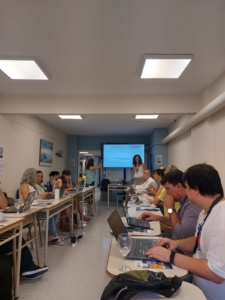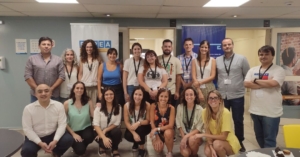Within the framework of the Annual Meeting of the Inter-American Development Bank (IDB), held in Panama, a group of civil society organizations met with the president of the Institution, Ilan Goldfajn, in an attempt to strengthen the link between the parties.
“Below, we offer a google translate version of the original article in Spanish. This translation may not be accurate but serves as a general presentation of the article. For more accurate information, please switch to the Spanish version of the website. In addition, feel free to directly contact in English the person mentioned at the bottom of this article with regards to this topic”.
Between March 16 and 19, the Annual Assembly of Governors of the Inter-American Development Bank (IDB) and IDB Invest was held in Panama City. It is a debate forum in which the members of the institution, together with those who preside over the central banks and other high-level authorities, discuss and address issues on issues considered to be a priority.
In the opening speech, the current president of the IDB, Ilan Goldfajn, outlined some of the institution’s priorities, which revolve around social issues such as food security, poverty, inequality, health, and education. In turn, he emphasized the mitigation of climate change and adaptation to it, stressing the need to deal with the increasingly frequent natural disasters in the Latin American and Caribbean region. The importance of preserving the biodiversity through the elaboration of an Amazon Regional Program.
The Board of Governors commissioned the preparation of a capital increase proposal for IDB Invest in order to implement a new business model that increases its impact on development through the private sector. In addition, he reiterated the importance of preparing a new Institutional Strategy proposal for the IDB Group, whose approval is scheduled for the next annual meeting in 2024.
The limited participation of civil society
After repeated requests made by a group of civil society organizations, the Bank authorized their participation in the event, although in a limited manner and closed to those who received an invitation. In addition, it was possible to arrange a meeting with the president of the IDB on March 17. In said meeting, the need to generate spaces for dialogue and express the demands of civil society in relation to the bank was raised. Both the possibility of participating in the event and the possibility of meeting with the president represent positive developments, although it remains to be seen if these are real changes in the institution. For now, the bank has invited to continue the dialogue in the coming months to achieve a more effective participation in the annual meetings of 2024.
From Fundeps we have been following and participating in this process together with organizations in the region that make up the IDB Working Group, and we will continue actively in the dialogue processes proposed by the bank.
More Information
– Governors endorse the vision, priorities and plans for the IDB Group | IADB
– Open letter from civil society organizations to IDB President Ilan Goldfajn – Fundeps
– The Brazilian Ilan Goldfajn is the new president of the IDB – Fundeps
– Open letter to the IDB for the election of a new presidency – Fundeps
Authors
Candela Jauregui
Valentina Rasso
Contact
Gonzalo Roza – gon.roza@fundeps.org


